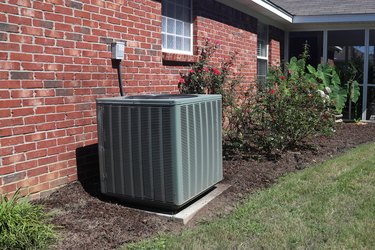
It's satisfying to save money by taking a do-it-yourself approach to things that need to be checked off the home maintenance to-do list. Nearly anything is possible, even mixing your own cleaning solutions. You may want to consider adding an oh-so-simple homemade air conditioner coil cleaner to your recipe list since commercial versions can get a bit pricey.
Few care to have more than minimal knowledge about the different parts of an air conditioning system, like compressors and condensers. How boring, right? The only thing that matters — repeat: the only thing — is that your trusty A/C kicks on, chills the air and keeps you comfy when things are heating up outside. However, even if you can catch on to just a bit of basic maintenance, you'll help extend the life of your system, and cleaning those coils is key.
Video of the Day
Video of the Day
So, What's in the Mix?
Even though there are all sorts of special coil cleaner products being marketed nowadays, the formula for a homemade air conditioning coil cleaner is hardly something you'll need to take notes for. It's basically just a good ol' soap and water combo.
In describing the difference between cleaning, sanitizing and disinfecting, the Centers for Disease Control and Prevention notes that cleaning is simply the process that removes impurities, dirt and germs from objects with soap and water. So, since you're not concerned about sanitizing or disinfecting those coils, you don't need to be terribly exacting in your formulation. Simply mix 1 teaspoon of liquid dishwashing detergent with 1 cup of water in an 8-ounce spray bottle and you're ready to go.
Coil Cleaning Is Crucial
As a rule, your condenser coils should be cleaned at least once a year, but common sense dictates that they should be cleaned whenever they're dirty, which can be determined by how heavy your A/C usage is and whether you have a filter and bother to change it.
Condenser coil fins are very tightly spaced, which allows them to easily become blocked by dirt and debris. The result is inefficient transfer of heat and insufficient cooling of your home. Serious blockage can lead to shortened system life that can hit you in the wallet, so cleaning the fins is important.
Locating and Cleaning the Coils
Your condensing unit — the part of your system containing the condenser coils — is the outside metal cabinet with slatted side panels and a grille on top covering the unit's fan blades.
Before you begin cleaning your air conditioner coils, be absolutely sure you have turned off the power to your unit. To access the coils, you'll need to remove the side panels and the top grille, which is normally attached to the fan blades. The removal process can vary by model, so consult the manual that came with your unit. Cover any electrical components, like the fan motor, with a garbage bag. Before getting the unit wet, pick up or vacuum any leaves or debris that may have gotten inside.
If there's heavy buildup, gently vacuum the coils first from the outside and inside with a soft vacuum brush. Next, spray the coils with your soapy solution and use a coil cleaning brush to carefully clean on the outside and inside. Finish by spraying gently toward the outside using a trigger-nozzle garden hose. Direct as much water as possible straight out toward the outside so you don't flood the inside of the unit.
If there is no heavy buildup of debris on the coils, you can clean them without a brush. Simply spray the soapy solution and rinse gently with the hose. Do not use a pressure washer. If you bend the fins or find that they were previously bent, use a fin comb to straighten them. Replace the panels and top grille and restore power.